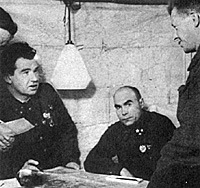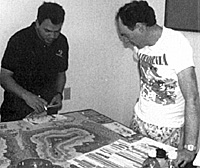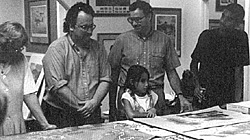 Through Operations, we amateurs watch attentively how seriously the professionals like Dean Essig and Ed Wimble debate the hobby [Ed. note: see "Point & Counterpoint" in Ops 17].
Through Operations, we amateurs watch attentively how seriously the professionals like Dean Essig and Ed Wimble debate the hobby [Ed. note: see "Point & Counterpoint" in Ops 17].
But think of it: how important can games be to those of us who merely purchase and play them compared to those who labor over their design and manufacture, and ultimately, who draw a major part of their families' livelihood from them? When professionals talk about the wargame industry's potential for growth, they're concerned with, among other things, print runs, sales, and profit. Essig seems to think wargames will never acquire mainstream acceptance, and although I don't know his rationale, I nevertheless agree with his opinion.
Back in high school I remember those dice-rolling dudes in the corner of the high school cafeteria, risking ridicule for the sake of two quick turns of Panzer Blitz before trig class. Those were the fanatics who went home after school to combine four or five copies of the game to pitch together a battle between divisions, rolling dice like desperate gamblers until dinner, the next morning digging through card catalogues for another book on Russian armor, and then eventually losing steam -- I see them now sitting quietly around the table, pondering the hexagonal wreckage as if posing for a group photo of Rodin's thinkers. Homework got in the way (after all, life comes fraught with imperfection), but weekends were predictably occupied with more dice rolling. The game only broke down due to severe burn-out, or when one or two of the guys went off to the local restaurant to bus tables or wash dishes, or maybe to check out a party with a keg. There weren't many of these guys running around back then in the late '70s, the supposed heyday of wargaming, and no wonder.
Staring intently at maps as if peering into a crystal ball, sliding cardboard counters an inch here and there, rolling dice and shuffling through charts, rule booklets, and tables: that's what non-players see. By contrast, my mother spends hours with a twelve-inch-long needle in each hand and every month or so she produces a sweater, baby blanket, or cat comforter. She finds it a fascinating, entertaining, eminently satisfying pastime, but one took at that ball of yarn and I have to reach for the No-Doze. The same effect no doubt strikes non-gamers when they're offered a "quick" round of some aficionado's favorite wargame. The fact is, our beloved hobby bores most people to tears.
It's a shame, considering how edifying the game can be. Inventing strategies, then re-thinking them when your opponent breaks through somewhere. Although other mentally stimulating hobbies abound, those who choose wargames find they exercise some of the finer qualities honed by chess players and other logic-minded thinkers-physicists and philosophers, perhaps-scaled down, naturally, to fit the modest intellectual demands of the paper battlefield.
A good player must size up the forces laid out on the table, identify strengths and weaknesses from a set of variables subject to change, plan ahead and predict how the opponent will try to seize the initiative, and above all, understand the fickle nature of cause and effect in a dynamic environment. Obviously I'm not claiming we gamers are the mental equals of nuclear physicists, but I will say that playing wargames stirs up more gray matter than an equal dose of flickering television.
 I find myself lamenting how the mental exercise demanded by even marginally complex games deters potential players (those lazy bums), yet I know how much easier it is to go to a movie, turn on the TV, or step out to the video store. Or, even, to open a book. Is it possible that our society tends to make freaks of those of us willing, even eager, to sacrifice hours for the sake of intense concentration and scheming?
I find myself lamenting how the mental exercise demanded by even marginally complex games deters potential players (those lazy bums), yet I know how much easier it is to go to a movie, turn on the TV, or step out to the video store. Or, even, to open a book. Is it possible that our society tends to make freaks of those of us willing, even eager, to sacrifice hours for the sake of intense concentration and scheming?
Walter Benjamin, a prima donna thinker of the early twentieth century, had this to say: "In the decline of middle-class society, contemplation became a school for asocial behavior; it was countered by distraction as a variant of social conduct." Although Benjamin wrote about European culture in the late 19th century, it's not a stretch to suggest that to be caught starting at a table for hours on end in a solitaire game is risky, unless you don't mind the nickname "Weirdo." Perhaps the operative word here is "banal." No matter how colorful and splashy the counters and map-sheets get, will games ever overcome their tedious character? Underneath the slick printing lurk the same old mountains of strength factors and movement points waiting to be counted and crunched into the CRT.
And what of books? I would be daft to argue wargames outshine books as educational sources, but thanks to my earliest Avalon Hill experiences I can still visualize the fish-hook layout of Meade's army at Gettysburg. Not because I read The Killer Angels or merely because I retain fond memories of spending evenings when I was twelve studying the American Heritage's two-volume set on the Civil War. Rather, I know the military aspect of the battle as well as I do because I personally maneuvered Sickles' 3rd Corps onto Big Round Top, ready for Longstreet to just try and flank me.
The situation came alive in a way that historical dissertation or even wellwritten narrative fell short of. I reenacted the battle through the abstract and inanimate set of pieces, experimenting with what didn't happen to better understand what did happen. Looking back I feel uncomfortably related to Civil War reenactment enthusiasts: those men, and women too, who every so often don period blues and grays to march en masse onto hallowed ground, firing blanks and playing dead with the ghosts of the past. At least they embrace the human element of historic battles, something wargames rarely model.
 Serious reenactists, pardon the expression, possess a marvelous sense of what film critics call a "suspension of disbelief." While they're marching the historic line between Seminary and Cemetery Ridge, gazing left and right along theirraggedbut beautiful butternut formation, gripping antiques just as Pickett's men might have done, some mightmanage to lose themselves in the reenactment. As they continue down one slope then up the other, they begin to feel-not think,feel-that although the relics of Hancock's guns up there near that notorious clump of trees may stand plugged and crewless, they nevertheless come to understand in a very real sense what it must have felt like a little after one in the afternoon on July 3rd, 1863.
Serious reenactists, pardon the expression, possess a marvelous sense of what film critics call a "suspension of disbelief." While they're marching the historic line between Seminary and Cemetery Ridge, gazing left and right along theirraggedbut beautiful butternut formation, gripping antiques just as Pickett's men might have done, some mightmanage to lose themselves in the reenactment. As they continue down one slope then up the other, they begin to feel-not think,feel-that although the relics of Hancock's guns up there near that notorious clump of trees may stand plugged and crewless, they nevertheless come to understand in a very real sense what it must have felt like a little after one in the afternoon on July 3rd, 1863.
If they're fortunate enough, Gettysburg the place becomes Gettysburg the time. It's an experience akin to the halfway point of a powerful move when you've forgotten you're in a theater elbow to elbow with two hundred others, profoundly distracted by the unreal goings on up on the screen. An absorption so complete that a lucky few in the audience slip away from their daily cares, waking up, so to speak, when the credits roll. Wargames must also deliver a "suspension of disbelief," at least to a small degree. That's why, for me anyway, a game must work properly.
Why, in the CWB for example, writing orders, albeit cartoonish ones, lends the series authenticity. If the mechanics of the game don't represent what went on historically, then the game loses its personality. Monopoly, for example, is a rather ineffective simulation of real estate economics, yet it's just realistic enough to stir up genuine emotions of greed. In the same vein, people whose disbelief dogs their every thought and refuses to be suspended, will push along that half-inch cardboard square feeling ever so nonplused by the fact that it represents 1,400 marching soldiers waiting for the enemy on the ridge to open up with canister. Such unenthusiastic players can't be expected to find the game intriguing. If it's just a piece of cardboard, with no potency whatsoever, then I say we leave them to their Scrabble.
Some people ride the pendulum too far the other way, as well. I've lost games because I couldn't bear to move my units in a way that seemed contradictory to the historical personalities involved. In ITQF, for instance, I don't need the McClellen Points rule. I take Mac's paranoia to heart.
National Park Remedy
But as for those fuddy-duddies who blunder about the world in a stupor of history-impairment, a real live national park is the only remedy. Yes, visiting a battlefield, even to mill about statues, plaques, and dioramas, say near Richmond, Fredericksburg, Yorktown, or Chattanooga, is to quietly breathe the air of the past. It means coming to a sublime understanding that those grandiose and terrible events we've read about not only happened, but they happened here. If that doesn't make one itch to play a wargame, then nothing will.
But there's another point altogether, and it's not a pleasant one. (By merely introducing this subject I risk being called "one of them bleeding-heart you know whats.") Nonetheless: People who survived war, especially civilians, find it shocking to walk into a hobby store and discover before them shelves loaded with the glorification of bloodshed. Immigrants are particularly vulnerable, at least those emigrating from war-weary places like Vietnam or Central America. Perhaps the San Francisco Bay area enjoys an unusually varied population, but I've met people, for instance, who recall the thunder-like clap above the Tehran airport at the start of the Iran-Iraq war, or the rumble of the Soviet tanks rolling through the streets of Prague. There's a depressingly long list of places outside America's borders where war swept through and left its mark. And these games-even the terminology riles many, to package war down into a "garne"-remind some people of things they can't bear to remember. Yes indeed, war is not without consequence.
In the 70s Nicholas Palmer wrote a book entitled The Comprehensive Guide to Board Wargaming, in which he cited a case where the game Wurzburg, an SPI title simulating a hypothetical nuclear-era Soviet offensive in Bavaria, was dropped like a ton of radioactive waste by its European distributor when a leading West German weekly "wrote a scathing article about people who have fun blowing up Wurzburg." Palmer insisted that "it would be more productive to worry about nuclear weapons than about games which refer to them" (p. 186). A rather naive statement, I think, possible only by viewing wargames, and warfare for that matter, in a moral vacuum.
The West German press was deeply worried about nuclear arms, which is why reminders like wargames hit a nerve. It's no surprise our hobby struggles with fewer followers in Europe, where the ghosts of the past are a living memory. Maybe that's the industry's greatest obstacle towards mainstream acceptance: a dubious topic. Despite our patriotic leanings, we tend to strip wargames of ethics, ignoring causes, and restraining ourselves from painting one side "good," the other "bad."
In Ardennes, for example, neither the German nor the American player need be conscious of a moral high or low ground, and the Malmedy incident is never referred to. Our games cleverly break down historic conflicts into two or more opposing forces with accompanying strengths, weaknesses, and objectives. I believe this aloofness is positive, even though I'm fully aware that war is a human effort and to rip away morality suppresses the human dimension. It's difficult to refrain from finger-pointing, but in its long and mournful record, has the earth witnessed a war in which both sides remained pure and true? To point out one side's atrocity over another's, or to scrutinize which group was less villainous as through it's the same as innocence, is pointless. This ethical neutrality parallels the soldier's predicament: "I have a job to do (besides staying alive)," he says, "and it doesn't involve pondering right and wrong."
That's our hobby's peculiar attraction. If wargames weren't clean and tidy, if they weren't far removed, no doubt they'd be even less popular than they already are. Yes, war is terrible-who could disagree? And yet, how do we explain away American Vets who purchase these games? Wouldn't we expect those who experienced bloodshed firsthand to shun all reminders of it, especially tactical treatments like the TCS or Squad Leader that delve mercilessly into the inner workings of the battlefield?
This might be a curious explanation, but here goes: perhaps war fascinates. It took a nut-case like Patton to think up this poetry: "Next to war, all human endeavor shrinks to insignificance."
Despite destruction, pain, and misery, we marvel at the power wielded in war, the nations rising to arm and conquer each other, the noble causes, the stubborn avarice, the madness of bloodlust; after all is said and done, the mechanics of power are bewilderingly exciting. This fascination, of course, blossoms only under certain circumstances. Our Vets who enlisted or were drafted, who felt the worst life has to offer, and those who even after coming home relived the fighting in their heads; they returned to find an America physically unscarred. They reacquainted themselves with a relatively stable environment where war is distant enough to be appreciated as a fascinating historical adjunct.
Am I suggesting, then, that we do the right thing and toss our game collections into a giant bonfire? That games are Satan's brew? That they inoculate young men to the idea that war is interesting, indirectly numbing the American population to the suffering of war, and thus promoting war? If our games enjoyed mainstream popularity, then I'd say "maybe." I'm no hypocrite though; I don't plan on cutting short my hobby any sooner than the stamp collector down the street is planning to go berserk and lick and mail his collection to the four comers.
Strange
Ours is a strange little hobby, and I don't agree with the sentiment that wargames are merely a grown-up version of toy soldiers. While some fail to grasp war's connection to politics, how the situations modeled by these games are historically rich and complex, others manage to recognize how poignantly war is fraught with tragedy. If anything, such sensitivity makes wargames more meaningful. Although it's easy to say "it's just a game," the combination of historical research, the sophisticated rules and mechanisms dreamed up, and especially, the subject matter represented and simulated tend to make these games a little more than mere "games."
And then we must admit that wargaming is a fringe market few people are aware of, and fewer make the effort to explore. Admirably, some gainers discuss ways of invigorating participation, even wondering why we don't devise a strategy to enlist recruits into our depleted ranks in the same way we would concoct a battle-plan in one of our games (see "Don't Mourn. Organize!" in Ops 14). Is there no way to reel in the droves of men and women who shun what seems to them complicated rules, or the eternity required to resolve a scenario, or the effort of remembering which units are cavalry and which are infantry? That's not to say all non-gamers shun a worthy test. Those who embrace intellectually challenging amusement may look elsewhere. To their credit, they might simply be put off by war.
So should we interject reminders of tragedy by instigating a mandatory bowing of our collective heads after every toss of the dice, in remembrance of those slain? Shall we exclaim "glorious day" as we ceremoniously lift a dead unit from the map- sheet? Or rather, shall we take the opposite extreme and coldly accept war as fundamental to history, while remaining suspicious of the causes, the outcomes, and the consequences?
Maybe we should just stick to Dean's advice from issue 17: "Relax and enjoy a game with a friend." We amateurs do that as often as we can, regardless of our occasional misgivings, always looking for the next unsuspecting guy to stumble into our den of iniquity and catch us red-handed: "Ali ha! that's one of those war games isn't it?"
"Yes," I say. "I'm one of them!
Back to Table of Contents -- Operations #20
Back to Operations List of Issues
Back to MagWeb Master List of Magazines
© Copyright 1996 by The Gamers.
This article appears in MagWeb (Magazine Web) on the Internet World Wide Web.
Other military history articles and gaming articles are available at http://www.magweb.com